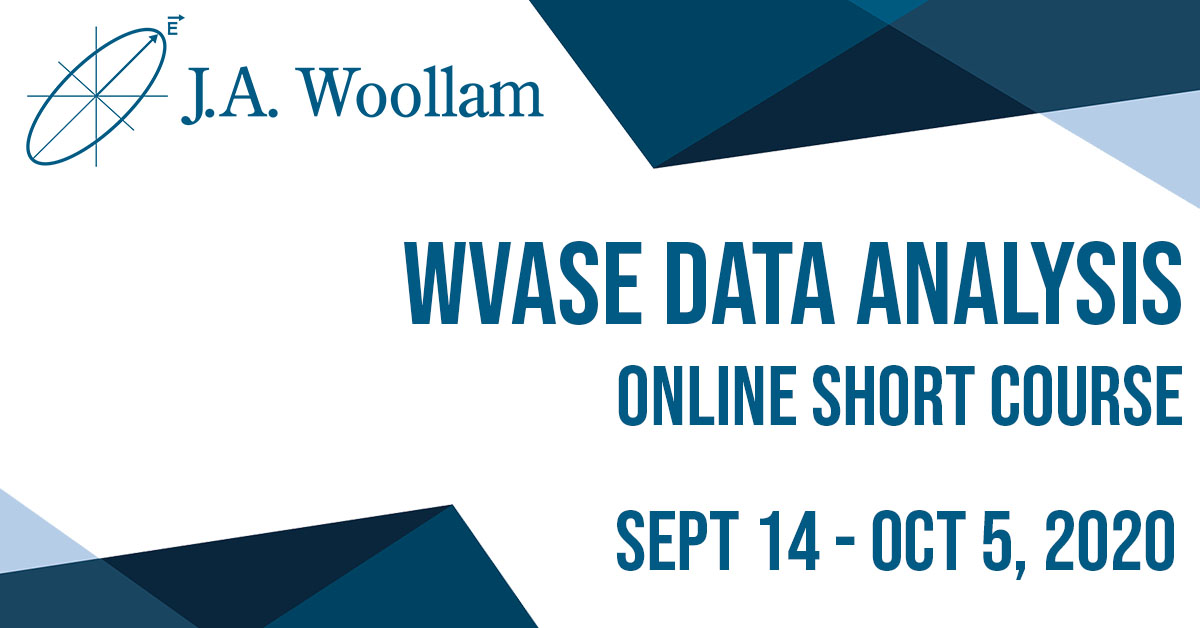2020 Fall WVASE Online Short Course
WHERE:
Online Webinar
WHEN:
Schedule below for live sessions. Recordings will be available after each session.
September 14, 2020 (Monday)
September 17, 2020 (Thursday)
September 21, 2020 (Monday)
September 24, 2020 (Thursday)
September 28, 2020 (Monday)
October 1, 2020 (Thursday)
October, 5, 2020 (Monday)
TIME:
1:00-3:00 PM CDT
Each session is 1.5 to 2 hours in length.
WHO:
Customers using WVASE® software
DEADLINE:
Registration ends September 11, 2020
COST:
$500 Standard Price
$250 University Price
OR
J.A. Woollam Tuition Credit
(2 participants per credit)
The J.A. Woollam Company is proud to announce an Internet-based ellipsometric data analysis course designed for WVASE® software users. We will introduce the fundamentals of data analysis at a beginner to intermediate level. There will be seven session in total (the last one is optional), with two sessions per week spread out over a 3.5 weeks. The sessions will be ~1.5 to 2 hours long.
If you use a different J.A. Woollam software package (i.e. CompleteEASE), please contact us for details regarding pertinent courses of interest for you.
Course Details
Each registered participant will be invited to participate in sessions, and to view recordings of each session afterwards. In addition to internet-sessions, students will receive relevant example data sets to practice. Homework can be sent to the instructor as a WVASE® environment file for review prior to the next session. Registered participants who submit all the homework will receive Certificates of Participation.
The Registration fee also includes pdf copies of the sessions and a pdf copy of the WVASE® Software Training manual as a download.
Internet conferencing
Participants must have internet access to participate in the webinar so they can log onto the course via GoToWebinar®. For audio, participants can either access audio from their computer via a VoIP connection from GoToWebinar®, or call one of the numbers provided by GoToWebinar® at the time of the session. Participants who are from the same organization/facility are welcome to participate from a conference room using a commonly shared computer, projector and audio connection.
Recordings of all sessions will made available to registered participants during the course and for a period afterwards.
For more information or questions, please contact Tom Tiwald at ttiwald@jawoollam.com
September 14
Session 1: Introduction to Ellipsometry
- Theory
- Modeling overview
- Modeling Semiconductor substrates
SEPTEMBER 17
Session 2: Dielectric substrates & transparent films
- The Cauchy function
- Films: Thickness & index effects
- Surface roughness, Global fits, Simple Grading
- Ultra thin films
SEPTEMBER 21
Session 3: Pt-by-pt fits & Intro to the Genosc layer
- Point-by-point fits for UV-absorbing materials
- Introduction to the Genosc layer
- Oscillator functions
- Fitting reference materials in the Genosc layer
September 24
Session 4: Applying the Genosc layer to ellipsometric data
- Using prebuilt Genosc layers
- Building Genosc layers from reference
- Create reference from pt-by-pt fit, then build Genosc layer
September 28
Session 5: Nonideal samples & introduction to anisotropy
- Nonideal samples: measurements, modeling & analysis
- Anisotropy: description, modeling & analysis (anisotropic transparent films only)
October 1
Session 6: Absorbing materials
- Opaque substrates
- Combining ellipsometry with transmission data
- Interference Enhancement
- Brief review of short course
October 5
Session 7: Case studies
We will review the complete analysis sequence of several “Case Studies”. We will discuss when and how we apply the various the tools learned in the short course to a complete analysis sequence, and emphasize best practices, including:
- Choosing measurement parameters
- Deciding if substrate analysis is necessary
- Modeling choices from start to finish: srough, grading, etc.


